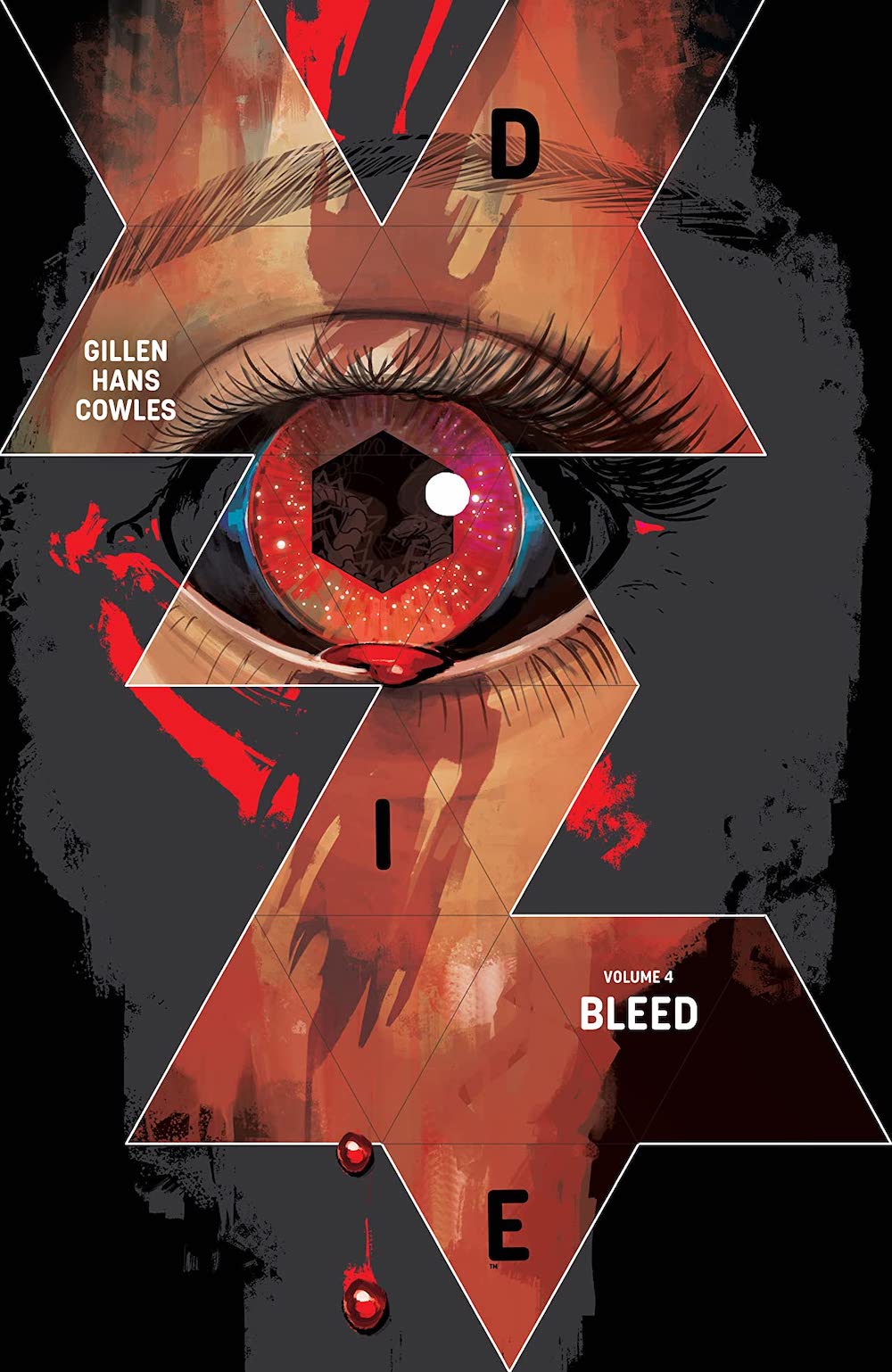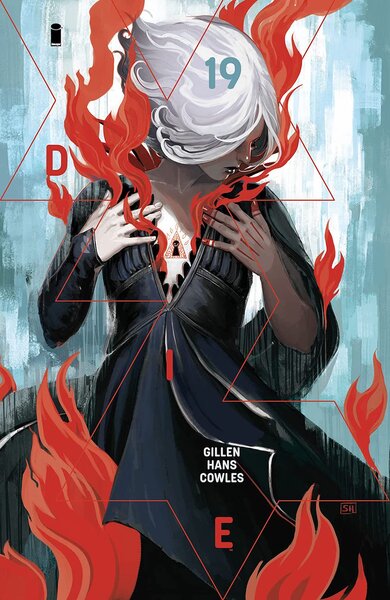Create a free profile to get unlimited access to exclusive videos, sweepstakes, and more!
Kieron Gillen and Stephanie Hans on bringing their acclaimed Image Comics epic 'DIE' to an end
The creators of the acclaimed Image fantasy comic look back on 20 issues of crawling through very personal dungeons.

Three years ago, writer Kieron Gillen and artist Stephanie Hans embarked on one of the most ambitious fantasy comics series in recent memory, which is saying something when you consider that their shared pedigree as creators includes work like Journey Into Mystery and The Wicked + The Divine. Launched in December, 2018, DIE began as a meta-textual examination of what tabletop RPGs are and do for people combined with the past-meets-present horror of something like Stephen King's IT.
The story of six friends who got sucked into a role playing game one of them designed, only for five of them to escape and then be sucked back in again to rediscover what happened to the sixth, DIE became one of the most compelling storytelling campaigns you were likely to witness on a comics page over the last three years, as Gillen and Hans explored the depths of suffering and triumph within each character, the origins of TTRPGs themselves, and the larger questions of what shared storytelling does for us as individuals and as a species. It's an epic work, and now after 20 issues, it exists as a complete story for new fans to find and old fans to reexamine.
This week the fourth DIE trade paperback, Bleed, arrived in bookstores, completing a release cycle that began all the way back in December of 2018. To mark the occasion, SYFY WIRE caught up with both Gillen and Hans to talk working together, resolving the story, how DIE changed the way they play RPGs in their own lives, and what might be next.
Kieron, you've told the origin story of this book previously, and described how after chewing the initial hook over you had a flash of what the story was about. Looking back, how close was that moment of realization to what actually ended up in the comic?
Kieron Gillen: Interesting question. The original idea was, "did I disappear into a fantasy world at the age of sixteen, and how much has this love of all this stuff harmed me?" That's where Sol came from—Peter Pan as Serial Killer. The original idea was making it the worst expression of that. But that idea was never going to be just the whole idea—Sol was always going to be more complicated, and that idea was the gateway to everything else, seen through the other characters.
The broader idea—what is fantasy for, for better or worse?—certainly is something we hit pretty hard. My stuff always includes the upside and the downside of cultural experiences. I'd have never have just done the down side, as it's as dishonest as just doing the upside.
Did all of the characters end up where you expected them to? Did any surprise you along the way?
KG: It's complicated. There were a handful of aspects I knew for certain up front, but how they played out was a surprise. Chuck would be a good example of that. I knew he had to go on a journey to get where he ended up (which I did know), but the specifics were uncovered as we explored (i.e. what made him become the person to do what he did). The big meta-question behind all of it is "Who are these people?" I knew that one part of Ash's journey was "So... what is this gender stuff with her?" and knew that I'd get to an answer of some kind, but I didn't know it'd climax with the confrontation on the bridge, or the specific nature of the coming out. Conversely "Narnia is all in the closet" was in my notes from the beginning. You see what I mean—things are both entirely planned and entirely open.
Stephanie, Kieron has described working with you as like working with the ocean, in that there's a lot of fluidity in the way you compose, to the point that he stopped attempting to lay out grids for you in scripting. With that sense of freedom in mind, how did your own style and approach evolve over the course of the series?
Stephanie Hans: That’s such a huge compliment.
I am a very organic painter and will always try to find what feels right for the script. That being said, for DIE, I chose a sober approach in the sequencing. I had been a bit more adventurous on my earlier marvel books for example , with creative paneling and all, but this is a 500+pages baby and my kind of art can be very dense. Simple paneling was the right way to not overwhelm the reader. With time, my style evolved to be a bit lighter, include a bit more backgrounds, or even negative space, to help with storytelling.
As an artist, I am of the kind who need to learn and grow all the time so of course, DIE was the perfect place to just do that and Kieron, [editor Chrissy Williams] and Image were really supportive at letting me running around like a crazy person until what I was doing made sense.
I was very lucky and they were very patient.
Has working for several years on DIE changed the way you approach tabletop RPGs in your own lives as players, and if so how?
SH: In a way, yes.
You see, I had played TTRPG a lifetime ago with a group I loved but when the group split, I almost never went back to it. I switched to video games as what I loved most in the RPG was what we were creating as a group and didn’t want to look for another one.
I never really thought about it until the last issue of DIE and as you may or may not have seen, I wrote a little something for them in the same issue.
Well life is weird and fun and we got in touch again and spoke a lot about life and games and we are actually planning on meeting in the next few months for a few drinks and a game. If you don’t see me for a couple of years, don’t be surprised, this basically the opening of the series.
KG: The weird thing has been the working on the [companion DIE RPG] simultaneously—I’ve described DIE as sort of something which exists outside the game and the comic. You kind of see what DIE is by juxtaposing the two, the two perspectives showing more of it, like a 3D effect. And it's not just doing the game. I've done a lot of thinking and playing RPGs over the last few years, of many sorts, over this period. I was playing intensely in the research beforehand, and that continues to this day. I just know more—in terms of theory and practise.
A lot of that is just a positive desire to share it. I've always been aware of the power in the form, but now I'm capable of precisely articulating the participatory magic them, for better or worse.
RPGs are a wonderfully democratic form—hell, even an activist form. They show people they can be active in their own stories, to create, both in games and out of it. It's not hard. Sit down with some friends, and you can do it. Creativity is infinite, and already yours.
Kieron has described DIE in the past as a story about how people carry on living with pain. What has the pain of these characters, and how they carry on with it, taught each of you about yourselves as creators and as people in living with this world and these people for the past few years?
KG: My brain has nearly broken from going from the real nitty gritty nature of wrestling with mechanics, to the actual large-scale, huge human existence stuff of this question. Well played.
But I think I'm going to have to dodge this. Short answer: they taught me a lot. They were six dungeons and I wrote to explore them, to find the treasures and monsters, to see if we can survive. I'm proud of them. They survived, and we did too.
SH: The last few years were very rough for all of us. Staying home for such a long time, with our universes getting smaller by the day was mentally draining. If there is something the characters brought to me, it was a kind of escapism. I have a tendency to daydream a lot about worlds and characters of the comics I f]draw while doing it, because once sketching is done, all the rest is just technical stuff and it can be boring for people with attention issues, so I think about them, I imagine their lives at home, or the backstories , the way they dress. I don’t really know if they specifically taught me something but we grew up together and wandered a lot through my mental landscapes.
Kieron has mentioned in the past that there's a possibility of returning to the world of DIE in another story at some point. Avoiding any potential spoilers for what that might be, what are you each excited about within that world that you'd love to explore in a deeper way?
SH: I am mostly excited about trying new techniques, because this is my job and I need to enjoy myself a lot. TLDR; Artists are gonna art. But mostly I am glad to keep a connection between us and the readers because reading their words of support through all these last years has been such a joy, and sometimes a lifeline. It’s such a privilege to still be able to walk together on this path for a while.
KG: DIE is a fantasy world which has an endless number of fantasy worlds nestling awfully inside it. It's an infinite canvas. It can be anything we need. Speaking broadly? Different types of groups. That said, all games of the RPG are canon. One thing I'm looking forward to is how everyone else populates those endless worlds. What excites people about DIE? I mentioned earlier what I love about RPGs, but the fundamentally participatory and expressive aspect is really high up. As Sol once said, it's all for you.
All four volumes of DIE are in stores now.
(This interview has been edited and condensed for length and clarity.)




























